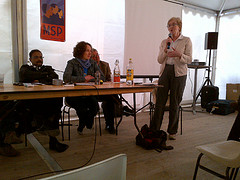We are at FAME (Forum Alternatif Mondial de l’Eau/ Alternative World Water Forum) this afternoon in ‘Cabaret Rouge 1′ for a Municipal Services Project (MSP) session on the need to connect research and activism. The session was introduced by saying that researchers need to be activists, and activists need to be researchers.
Council of Canadians chairperson Maude Barlow said that it was critical that researchers and activists work together for social justice.
She highlighted an occasional paper on public pension and sovereign wealth funds by Ronnie Lipschutz and Sarah Romano. That paper says that these funds are important sources of funding for public services around the world.
Barlow noted that unfortunately public sector pension funds are more commonly found on the open market, run by corporate-types, that they go to where there is the fastest return, and that the people or public sector workers have lost control of these funds. She said that because of this they can be used to fund private water services.
She told the 75+ people assembled that the Ontario Teachers Pension Plan (OTPP) has invested heavily in private water utilities in Chile. In fact, she added, they are the second biggest funder of private water there, with Suez in first place.
Barlow shared the story of meeting with the Ontario Teachers Federation (OTF). She said that rather than an ally in this matter, the OTF representatives defended their investments in private water. She said that they told her if they divested from private water then someone else would just invest in them, and when asked, they said they would invest in private education elsewhere too, as long as it was legal in that country. Barlow, who wrote a book on the importance of public education, said she was so shocked and angry at the OTF officials that she got up and left that meeting.
She said that the Council of Canadians has launched a campaign to change this situation. She noted that the Council has been outside a major teachers professional development day gathering in Toronto and collected signatures from teachers who oppose the use of their pension funds to undermine the right to water in Chile.
Barlow said that we need to come together – researchers and activists – and work on this situation with our public service unions.
We need to change this current reality. And one way to do this, she highlighted, is to have a special development bank so that public service pension and sovereign funds could be used better to provide the funds needed by public water services around the world.
Barlow added that Canadian pension funds may also be used to fund environmentally-destructive transmission lines to take power from major dams in the Patagonia region of Chile. She said that power would be used by Canadian mining companies in Chile (which are also harming water sources with their operations), and that Canadian aid agencies are also involved in promoting this. And she said that workers often don’t know that their pension funds are being used to fund these types of destructive projects.
In closing, Barlow said that we need to build an international movement to change this. She said that Chilean water workers approached the Council of Canadians to work on this and we are working to bring Ontario teachers to Chile so that they can see first-hand the consequences of how their pension funds are being used.
The session featured four other interesting presentations.
Greg Ruiters of the Municipal Services Project spoke about how the MSP functions around the world and highlighted the need to look beyond our own borders to understand and address the key issues of our day. He said that corporations don’t operate within national boundaries, so neither can we.
Amit Sengupta spoke about why activists can have a low opinion of researchers. He said there was mainstream, World Bank research that said it was better to teach people to wash their hands than to provide them with clean water. But he said research should not be about maintaining a status quo, but about changing things, it’s about liberation.
Carlos Crespo of the Universidad Mayor San Simon talked about the experience in Bolivia and the fight back against water privatization there.
And Susan Spronk from the University of Ottawa, who described herself as an activist-researcher, noted that social movement allies, like the Council of Canadians and the Canadian Union of Public Employees (CUPE) produce high-calibre, awesome research. And she added that activists often have academic credentials but don’t wear those on their sleeve. Still, she emphasized, collaboration between activists and scholar-activists is essential.
Brent Patterson, Political Director, The Council of Canadians
www.canadians.org/wwf



